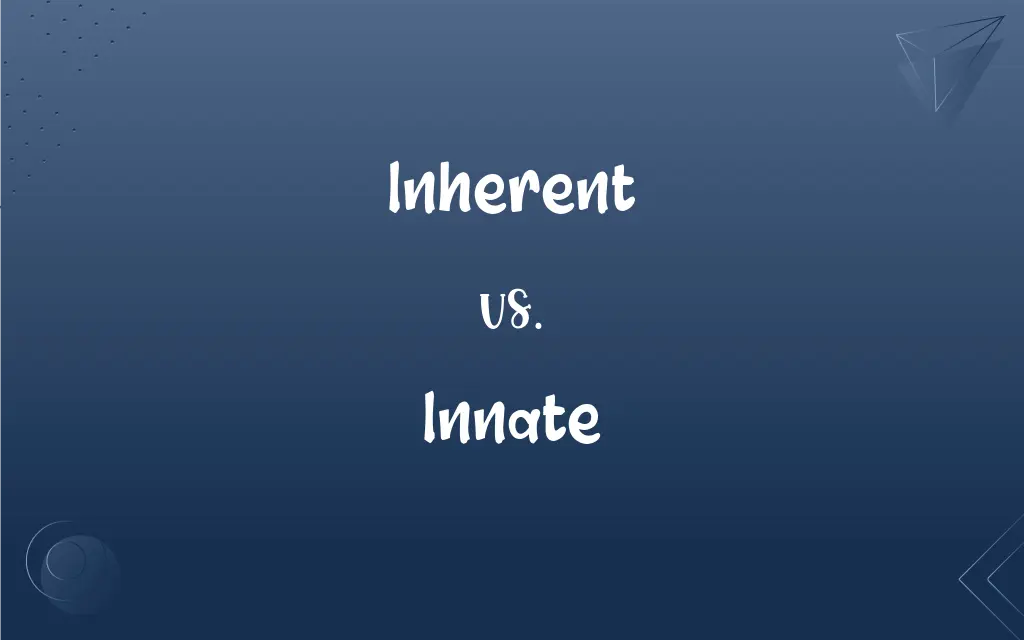Inherent vs. Innate: What's the Difference?
By Aimie Carlson || Updated on May 22, 2024
Inherent refers to qualities that are integral and naturally a part of something, while innate describes qualities that exist from birth or are inherent naturally without being acquired.

Key Differences
Inherent describes qualities or characteristics that are naturally a part of something, intrinsic to its nature. Innate, on the other hand, refers to qualities or abilities that are present from birth. These traits are not learned or developed over time but are inherent to an individual's nature from the outset.
Both terms deal with natural qualities, but inherent is broader, covering any intrinsic characteristic, while innate specifically focuses on those present from birth. Inherent can apply to both living beings and inanimate objects, whereas innate is typically used to describe biological or psychological traits.
The difference also lies in usage context. Inherent is often used in discussing properties of objects, systems, or concepts, while innate is more frequently used in the context of human or animal traits.
Comparison Chart
Definition
Naturally a part of something
Present from birth
Application
Objects, systems, concepts
Human or animal traits
ADVERTISEMENT
Acquisition
Not acquired, essential component
Present naturally from birth
Usage Context
Broad, can apply to various fields
Specific to biological/psychological traits
Example
Inherent strength of metal
Innate ability to sing
Inherent and Innate Definitions
Inherent
Naturally a part of something's nature.
The inherent beauty of the landscape was breathtaking.
Innate
Existing naturally within.
Innate behaviors in animals help them survive in the wild.
ADVERTISEMENT
Inherent
Essential characteristics.
Honesty is an inherent quality of a good leader.
Innate
Instinctive, not learned.
Babies have an innate ability to grasp objects.
Inherent
Existing as a permanent attribute.
Flexibility is an inherent feature of the new software.
Innate
Natural, not acquired.
The dog showed an innate sense of loyalty to its owner.
Inherent
Intrinsic to an object or system.
The inherent risk of investing in stocks must be considered.
Innate
Present from birth.
Her innate musical talent was evident from a young age.
Inherent
Built-in qualities.
The inherent design flaws led to the product's failure.
Innate
Inborn abilities or traits.
He has an innate understanding of complex math problems.
Inherent
Existing as an essential constituent or characteristic; intrinsic
The dangers inherent in the surgery.
The inherent instability of financial markets.
Innate
Existing naturally or by heredity rather than being learned through experience
"Chimpanzees show an innate distrust of contact with strangers" (Cindy Engel).
Inherent
Naturally as part or consequence of something.
Innate
Of or produced by the mind rather than learned through experience
An innate knowledge of right and wrong.
Inherent
Permanently existing in something; inseparably attached or connected; naturally pertaining to; innate; inalienable; as, polarity is an inherent quality of the magnet; the inherent right of men to life, liberty, and protection.
The sore disease which seems inherent in civilization.
Innate
Possessed as an essential characteristic; inherent
"As the Army and farmers built more and more levees, the Missouri lost an innate capacity to absorb its frequent excesses" (William Least Heat-Moon).
Inherent
Existing as an essential constituent or characteristic;
The Ptolemaic system with its built-in concept of periodicity
A constitutional inability to tell the truth
Innate
Inborn; existing or having existed since birth.
Inherent
Present at birth but not necessarily hereditary; acquired during fetal development
Innate
(philosophy) Originating in, or derived from, the constitution of the intellect, as opposed to acquired from experience.
Innate ideas
Inherent
In the nature of something though not readily apparent;
Shortcomings inherent in our approach
An underlying meaning
Innate
Instinctive; coming from instinct.
Innate
(botany) Joined by the base to the very tip of a filament.
An innate anther
Innate
(obsolete) To cause to exist; to call into being.
Innate
Inborn; native; natural; as, innate vigor; innate eloquence.
Innate
Originating in, or derived from, the constitution of the intellect, as opposed to acquired from experience; as, innate ideas. See A priori, Intuitive.
There is an innate light in every man, discovering to him the first lines of duty in the common notions of good and evil.
Men would not be guilty if they did not carry in their mind common notions of morality, innate and written in divine letters.
If I could only show, as I hope I shall . . . how men, barely by the use of their natural faculties, may attain to all the knowledge they have, without the help of any innate impressions; and may arrive at certainty without any such original notions or principles.
Innate
Joined by the base to the very tip of a filament; as, an innate anther.
Innate
To cause to exit; to call into being.
Innate
Not established by conditioning or learning;
An unconditioned reflex
Innate
Being talented through inherited qualities;
A natural leader
A born musician
An innate talent
Innate
Present at birth but not necessarily hereditary; acquired during fetal development
FAQs
Can a quality be both inherent and innate?
Yes, a quality can be both inherent and innate, such as a person's inherent and innate ability to breathe.
Is being inherent always positive?
Being inherent is neutral; it simply means the quality is a natural part of something, whether positive or negative.
Can inherent qualities change over time?
Inherent qualities are fundamental to the nature of something and usually do not change, though their expression might vary.
What does inherent mean?
Inherent means a quality that is naturally a part of something, essential to its nature.
How is inherent used in a sentence?
Inherent is used to describe something essential, e.g., The inherent value of gold makes it a reliable investment.
What is an example of an inherent risk?
An inherent risk is a fundamental risk present in an activity, such as the inherent risk of injury in contact sports.
What does innate mean?
Innate refers to qualities or abilities that are present from birth and not acquired through learning or experience.
Does innate apply to inanimate objects?
Innate typically does not apply to inanimate objects; it is used for traits or abilities present from birth in living beings.
Is intelligence inherent or innate?
Intelligence can be both inherent (naturally part of someone's nature) and innate (present from birth), influenced by genetics and environment.
How is innate used in a sentence?
Innate is used to describe something present from birth, e.g., She has an innate talent for languages.
Can an inherent trait be developed?
An inherent trait is naturally part of something, but its expression can be developed or enhanced over time.
Is morality inherent or innate?
Morality can be influenced by inherent predispositions and innate tendencies, but it is also shaped by environmental factors.
Are innate abilities genetic?
Innate abilities often have a genetic basis, though they can be influenced by environmental factors.
How do inherent and intrinsic differ?
Inherent and intrinsic are often used interchangeably, but inherent emphasizes being a natural part of something, while intrinsic emphasizes being essential to its very nature.
Can inherent qualities be negative?
Yes, inherent qualities can be negative, such as inherent flaws in a design.
What is an example of an innate behavior?
An innate behavior is a natural, instinctive action, like a bird's innate ability to build a nest.
Is the ability to learn inherent or innate?
The ability to learn is generally considered innate, present from birth, and part of human nature.
Is personality inherent or innate?
Personality is shaped by both inherent factors (natural dispositions) and innate traits (present from birth), along with environmental influences.
Do all living beings have innate behaviors?
Yes, all living beings exhibit some innate behaviors that are crucial for their survival and functioning.
Can cultural traits be inherent?
Cultural traits are not inherent; they are acquired through socialization and experience.
About Author
Written by
Aimie CarlsonAimie Carlson, holding a master's degree in English literature, is a fervent English language enthusiast. She lends her writing talents to Difference Wiki, a prominent website that specializes in comparisons, offering readers insightful analyses that both captivate and inform.
































































